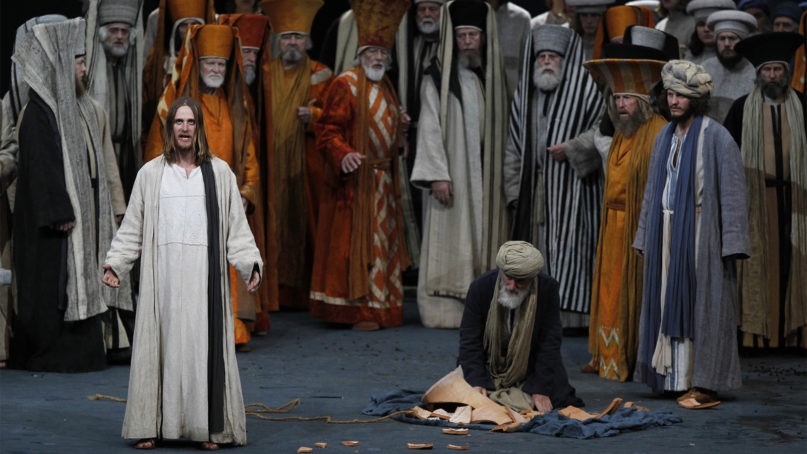(RNS) — The Oberammergau Passion Play, performed decennially in Germany’s Bavaria since 1634, was, until relatively recently, believed to be irredeemably anti-Semitic. Jews were portrayed in words, costumes and mannerisms as greedy, bloodthirsty, devilish and legalistic. Jesus was “Christian” and “the Jews” killed the Messiah, the Son of God.
Adolf Hitler saw the play in 1930 and in 1934 – the play’s 300th anniversary — and cynically understood it as an irresistible tool in his path toward demonization, deportation and destruction of the Jewish people. In praising the play, he proclaimed, “Never has the menace of Jewry been so convincingly portrayed.”
The Holocaust and subsequent Christian institutional self-reflection should have been enough to change the negative tide in Oberammergau. In 1965, Nostra Aetate, a declaration of the Catholic Church’s Second Vatican Council, rejected collective Jewish guilt in the death of Jesus. It taught that “Jews should not be presented as rejected or accursed by God, as if this followed from the Holy Scriptures.”
But change came slowly to Oberammergau. My organization, the American Jewish Committee, and other Jewish organizations demanded change in the past decades, but Oberammergau’s leadership was resistant. As late as 1980, Rabbi Marc Tanenbaum, then the AJC’s interreligious affairs director, called Oberammergau’s Passion “one of the most anti-Semitic presentations anywhere in the world.”

Christian Stückl in 2018. Photo by Henning Schlottmann/Creative Commons
Progress began in 1987, two generations after the Holocaust and one generation after Nostra Aetate, when Christian Stückl, a native of Oberammergau and founder of a local theater company, was elected to direct Oberammergau’s main event. Still in his mid-20s, he began transforming the play and using its path toward rehabilitation as a vehicle for addressing Germany’s ant-Semitic past.
By 2010, Stückl had already eliminated the most heinous anti-Jewish excesses from the play and introduced a Jewish Jesus, who holds aloft a Torah facsimile and leads hundreds of Oberammergau residents in Hebrew singing of an original composition of the Jewish prayer Shema Yisrael.
The portrayal of Jesus as unequivocally Jewish does make a difference. Christian embrace of Jesus’ Jewishness has contributed mightily to the diminution of anti-Judaism and anti-Semitism. As Pope Francis has said many times in different ways, anti-Semitism is a sin and irrationally un-Christian, given Christianity’s Jewish roots and Jesus’ Jewishness.
Why does the Oberammergau Passion Play matter? For one thing, it is seen by half a million people during its 100-performance season. As the largest and longest-running of all Passion plays, too, it influences a worldwide genre that spawned anti-Jewish attitudes and violence over centuries.
Moreover, the Bavarian venue, where the Nazi Party had flourished, magnifies the play’s significance as Germany continues to grapple with its darker past, working to prevent anti-Semitism from reemerging.
The 2010 play was not perfect in eliminating all anti-Jewish tropes, but we dare not let the perfect be the enemy of progress.

The stage of the Oberammergau Passion Play in 2000. Photo courtesy of Creative Commons
Stückl is a receptive partner who welcomes input, both affirming and challenging, aimed at assuring historically accurate portrayals of first-century Roman and Jewish leadership and power.
With the full cooperation of the Oberammergau leadership, AJC has convened an academic advisory group that is consulting with Stückl and his team as they continue to address lingering anti-Jewish tropes in the play.
Earlier this year, the advisory group met in the U.S. with the Oberammergau play’s visiting leadership, and in mid-November the group traveled to Oberammergau for a three-day site visit to view the 2020 costumes and sets and to comment on the 2020 script evolution. Timed to coincide with the visit, AJC launched a website dedicated to understanding Oberammergau in the context of Christian-Jewish relations.
Further progress in revising the play will make clear that “the Jews” did not kill Jesus. It will counteract the implausible assertion that Caiaphas, the high priest, could have demanded and dictated that the disproportionately more powerful Roman governor, Pontius Pilate, crucify Jesus.
When the Roman Catholic archbishop of New York, Timothy Dolan, now a cardinal, saw the play with AJC in 2010, he said that Oberammergau “is a paradigm for the friendship of Jews and Catholics; it has shown low points in their relations in the past, but now it has also become a sign of great progress.”
That is an aspiration both Christians and Jews can embrace.
(Rabbi Noam E. Marans is the American Jewish Committee’s director of interreligious and intergroup relations. The views expressed in this commentary do not necessarily reflect those of Religion News Service.)





